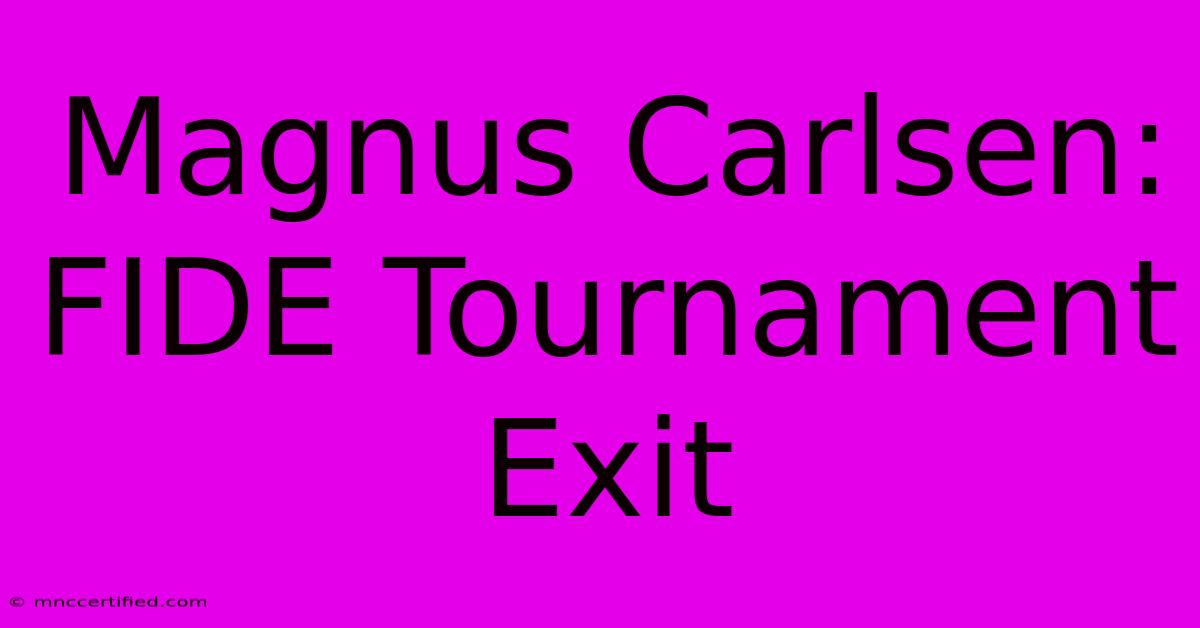Magnus Carlsen: FIDE Tournament Exit

Table of Contents
Magnus Carlsen: A Shocking FIDE Tournament Exit & What It Means for Chess
The chess world is reeling. Magnus Carlsen, the reigning world champion and arguably the greatest chess player of all time, has unexpectedly withdrawn from the 2023 FIDE World Cup. This decision, announced with minimal explanation, sends shockwaves through the global chess community and leaves many questions unanswered. This article delves into the specifics of Carlsen's exit, explores potential reasons behind his decision, and discusses the broader implications for the future of professional chess.
The Announcement and Initial Reactions
Carlsen's announcement was abrupt, leaving fans and commentators scrambling for answers. The lack of a detailed explanation fueled speculation, with theories ranging from burnout to strategic considerations. Social media erupted with reactions, from disbelief and disappointment to analyses of his recent performance and potential future plans. The immediate impact on the tournament was significant, altering the dynamics of the competition and creating an unexpected opening for other players.
Analyzing Carlsen's Recent Performance
Before his withdrawal, Carlsen's performance in the World Cup wasn't overwhelmingly dominant, but it wasn't subpar either. A closer look at his games reveals a pattern of consistent, high-level play, albeit without the breathtaking brilliance that has become his trademark. Some analysts suggest this might indicate a decline in his competitive edge, perhaps contributing to his decision to withdraw. However, others argue that even a "less impressive" Carlsen is still a formidable opponent.
Possible Reasons Behind Carlsen's Withdrawal
Several theories have emerged to explain Carlsen's unexpected exit. Let's explore some of the most prominent ones:
1. Burnout and Mental Fatigue:
The relentless pressure of maintaining his position at the top of the chess world for over a decade is immense. The constant travel, intense competition, and media scrutiny can take a toll on even the most resilient individuals. Burnout is a very real possibility, and it's a factor that many speculate played a significant role in his decision.
2. Strategic Considerations:
Some believe Carlsen's withdrawal might be a calculated strategic move. Perhaps he recognized limitations in his current approach or felt that focusing on other aspects of his chess career—like his online chess platform or commentary work—might be more beneficial in the long run. This theory remains largely speculative, but it's a valid consideration.
3. Disillusionment with the Tournament Format:
While less discussed, it's possible Carlsen felt disillusioned with the format of the FIDE World Cup itself. Perhaps he felt the structure didn't adequately reflect his competitive goals or that other aspects of the tournament were unsatisfactory.
The Wider Implications for Professional Chess
Carlsen's withdrawal has significant consequences for the future of professional chess. His absence creates a void at the top, opening up opportunities for other players to rise to prominence. It also raises questions about the pressures faced by elite chess players and the sustainability of their careers at the highest level. The incident serves as a reminder of the importance of mental health and well-being in high-stakes competitions.
Conclusion: Uncertainty and Speculation
Magnus Carlsen's exit from the FIDE World Cup remains shrouded in some mystery. While the official reasons remain unclear, the various theories highlight the multifaceted pressures and challenges faced by top chess players. His decision undoubtedly leaves a lasting impact on the chess world, prompting discussions about player well-being, competition formats, and the future of the sport. Only time will tell what Carlsen's next move will be, but one thing is certain: the chess world will be watching closely.
Keywords: Magnus Carlsen, FIDE World Cup, Chess, World Champion, Retirement, Burnout, Mental Health, Chess Tournament, Professional Chess, Chess Strategy, Chess News, Chess World
On-Page SEO: The article utilizes header tags (H2, H3) effectively to structure the content and improve readability. Keywords are naturally integrated throughout the text, focusing on variations and synonyms to avoid keyword stuffing. The meta description (which would be included in the HTML) would be crafted to attract clicks from Google search results.
Off-Page SEO: This would involve promoting the article through various channels, including social media sharing, guest posting on chess-related blogs, and building backlinks from relevant websites. Reaching out to chess influencers and publications is also crucial for off-page SEO.

Thank you for visiting our website wich cover about Magnus Carlsen: FIDE Tournament Exit. We hope the information provided has been useful to you. Feel free to contact us if you have any questions or need further assistance. See you next time and dont miss to bookmark.
Featured Posts
-
Olivia Hussey Romeo And Juliet Actress Passes
Dec 29, 2024
-
Trent To Real Madrid Latest News
Dec 29, 2024
-
Trent Arnold Keeping His Word
Dec 29, 2024
-
Pdc World Champs 2025 Humphries
Dec 29, 2024
-
Husker Victory Key Nebraska Football Stats
Dec 29, 2024